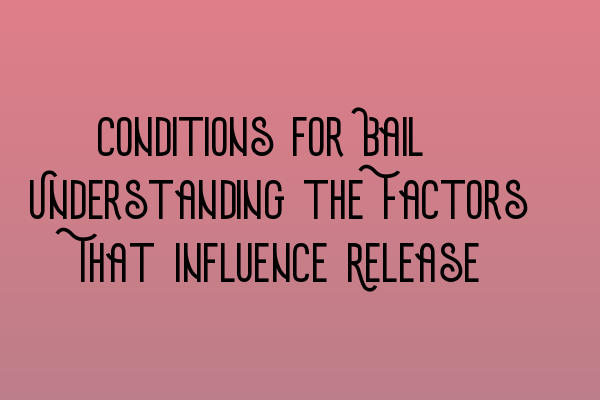Conditions for Bail: Understanding the Factors That Influence Release
When a person is arrested and charged with a criminal offense, they may have the option to be released on bail
pending their trial. Bail allows the individual to remain in the community while their case progresses through the
criminal justice system. However, the court will only grant bail if certain conditions are met. In this article, we
will explore the factors that influence the decision to grant bail and the conditions that may be imposed.
Factors Influencing the Decision for Bail
Several factors are considered when assessing whether an accused person should be granted bail. These factors include:
- Severity of the offense: The seriousness of the alleged offense is a significant factor in determining whether
bail should be granted. If the offense is minor and the accused is not deemed a threat to the community, they
are more likely to be released on bail. - Previous criminal record: A person’s criminal history plays a crucial role in the bail decision. If the accused
has a previous record of similar offenses or a history of failing to appear in court, their chances of being
granted bail may decrease. - Flight risk: The likelihood of the accused fleeing or not appearing in court is considered. Factors such as
ties to the community, employment, and family circumstances are taken into account when assessing the flight
risk. - Public safety: The safety of the community is of paramount concern. If the accused poses a threat to the
community or has a history of violent behavior, the court may be less inclined to grant bail. - Evidence and strength of the case: The strength of the prosecution’s case and the evidence against the accused
are also considered. If the case against the accused is strong, the court may be more hesitant to grant bail. - Character references and support: Positive character references and evidence of a strong support network can
be beneficial when seeking bail. These factors demonstrate that the accused is less likely to reoffend or
abscond.
Conditions Imposed with Bail
When the court grants bail, it can impose certain conditions that the accused must adhere to while released. These
conditions may include:
- Residence requirement: The accused may have to provide an address where they will reside while on bail. They
may be required to report to a designated police station regularly. - Curfew: A curfew may be imposed, restricting the accused’s movement during specific hours. This condition helps
ensure that the accused remains within their residence during designated times. - Surrender of travel documents: In cases where the accused is deemed a flight risk, they may be required to
surrender their passport or any other travel documents to prevent them from leaving the country. - Non-contact orders: The court can order the accused to have no contact with certain individuals involved in the
case or with potential witnesses. This condition protects the integrity of the ongoing investigation. - Drug or alcohol restrictions: To address issues of substance abuse, the court may impose conditions that require
the accused to abstain from alcohol or drugs and submit to regular testing. - Bail bond or surety: In some cases, the accused may be required to pay a bail bond or enlist the help of a
surety who commits to ensuring the accused’s compliance with the bail conditions.
It is important to note that the specific conditions imposed with bail can vary depending on the circumstances of
each case. The court will tailor the conditions to address any potential risks associated with the accused’s
release.
If you want to learn more about SQE Criminal Law & Practice in the UK, be sure to check out our SQE 1 Practice Exam Questions and
SQE 1 Practice Mocks FLK1 FLK2 for
comprehensive preparation. Our SQE 2 Preparation Courses and
SQE 1 Preparation Courses are also available to help you
excel in the SQE exams. Stay updated with the latest SRA SQE Exam Dates to plan your exam schedule effectively.
If you have any questions about bail or any other legal matters, feel free to contact SQE Criminal Law & Practice Law UK, and our expert solicitors will be happy to assist you.
